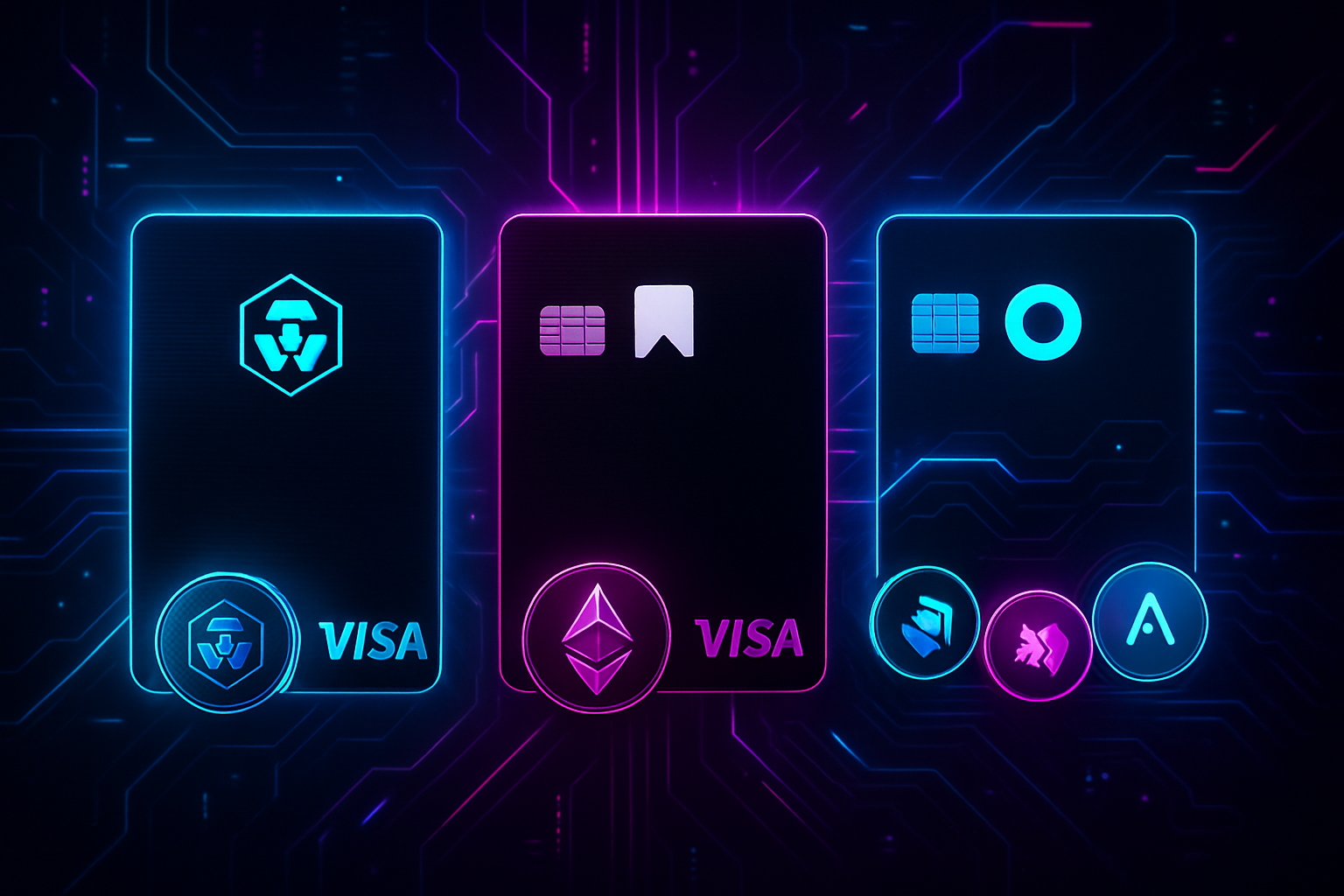
Crypto rewards cards have evolved far beyond simple cashback in Bitcoin or Ethereum. In 2024, the best crypto rewards cards are those that empower users to earn governance tokens – unlocking both financial returns and meaningful participation in DeFi protocol governance. If you’re looking to maximize your crypto rewards while gaining a voice in decentralized ecosystems, understanding which cards offer governance token payouts is crucial.

Why Governance Token Rewards Matter for Crypto Cardholders
Governance tokens are more than just speculative assets. They grant holders voting rights over major protocol decisions, treasury allocations, and future upgrades. When you earn these tokens through everyday spending, you’re not just stacking potential gains – you’re also becoming an active stakeholder in the direction of DeFi itself. This dual benefit sets governance token rewards apart from traditional crypto cashback models.
With that context, let’s break down the leading crypto rewards cards that pay out in governance tokens and examine what makes each stand out for 2024.
Top 3 Crypto Rewards Cards with Governance Token Payouts
Comparison of Top 3 Crypto Rewards Cards with Governance Token Payouts (2024)
| Card Image | Card Name | Governance Token Rewards | Annual Fees | Supported Cryptocurrencies | Unique Features |
|---|---|---|---|---|---|
|  | Crypto.com Visa Card | CRO (Crypto.com Coin) – 1.5% to 8% back, depending on tier | $0 (annual fee); higher tiers require CRO staking | Supports 20+ cryptos including BTC, ETH, CRO, USDC | Tiered rewards, rebates on Spotify/Netflix/Amazon/X, Priority Pass lounge access, global interbank rates |
|  | Monolith Visa Debit Card | MKR & other DeFi governance tokens via on-chain rewards | $0 (no annual fee) | ETH, DAI, MKR, and other ERC-20 tokens | Non-custodial wallet, direct DeFi integration, on-chain governance rewards, spend from Ethereum wallet |
|  | Coinbase Card | Rotating governance tokens (COMP, UNI, AAVE, etc.) up to 4% back | $0 (no annual fee); 2.49% crypto conversion fee (waived for USDC) | BTC, ETH, USDC, COMP, UNI, AAVE, and more | Direct Coinbase integration, flexible reward selection, instant spending from Coinbase balance |
The following three cards lead the market by providing direct exposure to on-chain governance through their unique reward structures:
1. Crypto. com Visa Card (CRO Rewards)
The Crypto. com Visa Card remains a dominant force among DeFi rewards cards thanks to its tiered CRO reward system. Users can earn between 1.5% and 8% back in CRO – the native governance token of the Crypto. com ecosystem – depending on how much they stake. Higher tiers unlock premium benefits like Spotify and Netflix rebates and Priority Pass lounge access for frequent travelers.
CRO isn’t just a speculative asset; it provides voting rights within the Crypto. org Chain and influences key platform upgrades. This means your daily purchases can translate into real influence over one of the fastest-growing blockchain networks.
2. Monolith Visa Debit Card (MKR and DeFi Governance Token Rewards)
The Monolith Visa Debit Card is purpose-built for DeFi enthusiasts who want their spending power to directly support decentralized protocol development. Unique among its peers, Monolith allows users to earn rewards in MKR (MakerDAO’s governance token) as well as other major DeFi tokens like LEND or SUSHI depending on promotional periods.
MKR holders participate in critical MakerDAO votes – such as stability fee adjustments or collateral onboarding – giving cardholders a direct say in one of DeFi’s foundational protocols. For those passionate about decentralized finance’s future, this card is a compelling option.
3. Coinbase Card (Governance Token Reward Options: COMP, UNI, AAVE)
The Coinbase Card stands out by letting users choose their preferred reward token from a rotating selection that includes major governance tokens like COMP (Compound), UNI (Uniswap), and AAVE (Aave). With up to 4% back on purchases paid directly into your Coinbase account, this flexibility allows users to diversify their exposure across leading DeFi protocols while actively participating in their respective DAOs.
DeFi Participation Through Everyday Spending: How It Works
Earning governance tokens via your daily transactions is both straightforward and powerful:
- Spend with your card: Use your chosen crypto rewards card as you would any debit or credit card for online or offline purchases.
- Earn automatic rewards: Receive a percentage of each purchase back in CRO (Crypto. com), MKR/other DeFi tokens (Monolith), or COMP/UNI/AAVE (Coinbase).
- Participate in protocol voting: Once accumulated, these tokens can be used to vote on proposals within each respective DAO ecosystem – giving you an active role in shaping platform policies and upgrades.
Navigating Fees, Availability and Volatility Risks
No two crypto rewards cards are created equal when it comes to fees and accessibility:
- The Crypto. com Visa Card: Higher-tier cards waive most foreign exchange fees but require significant CRO staking upfront; lower tiers have some FX fees attached.
- Monolith Visa Debit Card: No annual fee but limited regional availability; check if it operates within your jurisdiction before applying.
- Coinbase Card: Simple integration with your existing Coinbase account but watch out for conversion fees when spending non-USDC assets; these may impact net reward value.
It’s essential to weigh these factors against your personal spending habits and DeFi interests. For frequent travelers or high-volume spenders, the higher-tier Crypto. com Visa Card may justify its staking requirements through enhanced perks and fee waivers. Meanwhile, Monolith’s focus on pure DeFi governance exposure will appeal to users who value on-chain participation over mainstream usability. The Coinbase Card, with its broad token selection and instant reward payouts, is ideal for those who want maximum flexibility and seamless integration with a familiar platform.
Comparing Governance Token Rewards: Which Card Delivers the Most Value?
The real value of governance token rewards depends on several dynamic factors, reward rates, token utility, and your willingness to participate in protocol governance. Here’s a quick comparison of the three cards’ key features:
Feature Comparison: Top Crypto Rewards Cards with Governance Token Payouts (2024)
| Card Name | Governance Token Rewards | Reward Rate | Additional Perks | Fees | Availability |
|---|---|---|---|---|---|
| Crypto.com Visa Card | CRO (Crypto.com Coin) | 1.5% – 8% (tiered, based on staking) | Spotify, Netflix, Amazon, X rebates; Priority Pass lounge access (higher tiers) | No annual fee; Foreign exchange fees for lower tiers, waived for higher tiers | Global (regional restrictions may apply) |
| Monolith Visa Debit Card | MKR (Maker) & DeFi governance tokens | Varies (based on DeFi protocol participation) | Direct on-chain DeFi rewards; Non-custodial wallet integration | No annual fee; Standard transaction fees may apply | Europe & UK |
| Coinbase Card | COMP, UNI, AAVE (user can choose) | Up to 4% (rotating rewards) | Integrated with Coinbase app; Instant crypto conversion | 2.49% conversion fee (waived for USDC spending) | US, Europe, UK |
CRO, MKR, COMP, UNI, and AAVE each represent different approaches to DeFi governance. CRO grants you a say in Crypto. org Chain development; MKR lets you vote on MakerDAO’s stability rules; COMP, UNI, and AAVE empower you within some of DeFi’s largest lending and trading protocols. The ability to earn these tokens passively through spending is a unique advantage that can compound both financially and in terms of influence.
Maximizing Your On-Chain Influence With Everyday Purchases
If your goal is not just passive income but also active participation in shaping DeFi’s future, consider how each card aligns with your preferred protocols. For example:
- If you’re bullish on MakerDAO’s role as a decentralized stablecoin backbone, Monolith’s MKR rewards put voting power directly in your hands.
- If you see Compound or Uniswap as central pillars of the DeFi ecosystem, earning COMP or UNI via Coinbase Card spending makes every purchase a step toward greater protocol involvement.
- If you want broad exposure plus lifestyle perks (like streaming rebates), Crypto. com offers an all-in-one gateway to both rewards and utility.
The best strategy often involves blending multiple cards based on your lifestyle needs and governance interests. Just remember that holding governance tokens comes with both upside potential and volatility risk, active participation can help mitigate some risks by letting you influence protocol direction.
The Future of Crypto Rewards Cards: Community Power Meets Financial Autonomy
The rise of crypto rewards cards distributing governance tokens signals a shift from passive earning to active community engagement. As more protocols decentralize decision-making, everyday users wield unprecedented influence through their spending choices. Whether you’re after the highest APY or passionate about shaping DeFi policy, choosing the right card unlocks both financial benefits and a seat at the table.
For deeper dives into maximizing your earnings or understanding DAO voting mechanics, explore our comprehensive guides at cryptocardtips. com or check out reviews from trusted sources like Crypto.com. Stay informed, the landscape is evolving fast, but informed choices today can pay off exponentially tomorrow.













